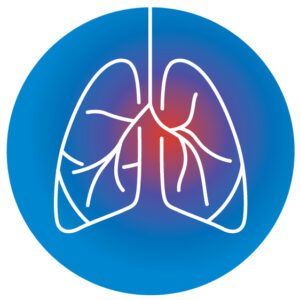
Understanding Alpha 1 Disease
Each year, the Alpha-1 Foundation recognizes November as Alpha-1 Month in order to raise awareness about — and raise funds to support the fight for a cure for — Alpha-1 antitrypsin deficiency (Alpha-1).
Also known as “genetic COPD,” Alpha-1 is a rare, genetic, and progressive condition that affects the lungs and/or the liver, and can lead to serious disease in one or both.
Alpha-1-antitrypsin (AAT) is a protein produced by the liver that travels through the blood and protects the lungs from inflammation caused by inhaling irritants such as tobacco, wildfire smoke, air pollution, or dust. If you have AAT deficiency and are exposed to these irritants, your lungs can become more easily damaged. This damage can make it harder to breathe and puts you at greater risk of emphysema, a type of
chronic obstructive lung disease (COPD).
Risk Factors
AAT deficiency is inherited, unpreventable, and incurable. There are an estimated 80,000 to 100,000 people living with AAT deficiency in the United States, and while anyone can inherit the condition, it is more common in white people of Northern European ancestry.
Everyone inherits two AAT genes, one from each parent. If both of your inherited genes are mutated or changed, you will have AAT deficiency. If you inherit a mutated AAT gene from one parent and a normal AAT gene from the other, you’re considered a carrier for the condition. While you might have lower levels of AAT protein in your blood, you most likely won’t have AAT deficiency. You might pass the mutated gene to your children, however.
Symptoms
Symptoms of AAT deficiency can begin to appear early in life, but many will not begin until you reach middle age.
These symptoms can include:
• Shortness of breath
• Chronic cough with mucus or phlegm
• Wheezing
• Fatigue or tiredness
• Reduced stamina while exercising
• Frequent lung infections like cold or flu
If your liver is affected by AAT deficiency, you may experience fatigue, loss of appetite, weight loss, swelling of the feet or abdomen, jaundice, yellowish discoloration of the white part of the eyes, vomiting of blood, or blood in your stool.
You can also develop a skin disease called panniculitis, which results in hardened patches and red, painful lumps.
Detection
While many people don’t know that they have AAT deficiency, early diagnosis can help prevent COPD and other serious lung diseases.
Consult your physician if you have a family member who has AAT deficiency or was a smoker who was diagnosed with COPD between ages 40 and 50. People who smoke with AAT deficiency often develop the disease a decade earlier than people who don’t smoke.
Tests and procedures for AAT deficiency your healthcare provider may perform include:
• Blood test to check the level of alpha-1 antitrypsin protein in your body.
• Lung function tests like a spirometry test to determine how well your lungs are working, as well as imaging tests like a chest X-rays or CT scans of your lungs to check for damage in the lungs or rule out other conditions.
• If your physician suspects AAT deficiency is affecting your liver, he may order blood testing of liver function and, sometimes, an ultrasound.
If you have low levels of AAT but normal liver and lung function, you may not need treatment. You’ll likely be monitored with repeat testing over time, however.
Treatment
There is no cure for AAT deficiency, but there are treatments to slow the lung damage it causes.
If you have emphysema and AAT, you’ll receive standard COPD treatments like bronchodilators, inhaled steroids, antibiotics, oral corticosteroids, regular vaccinations, oxygen therapy, or pulmonary rehabilitation.
You may also need a lifelong treatment called augmentation therapy, which involves raising your AAT protein level to acceptable amounts. This helps slow down lung damage.
If you have COPD, you may also need medicines or other treatments.
AAT deficiency research is quickly advancing, so clinical trials are available for people living with the disease.
Some patients with advanced lung disease may be candidates for lung transplantation.
Dr. Mike had the honor of speaking with Len Geiger, an Alpha-1 patient advocate who required a double lung transplant to survive this condition.
Watch Len’s inspiring story below.
Timely AAT deficiency diagnosis and treatment can improve your quality of life — and perhaps even extend it. If you think you might be at risk for this condition, please call at (423) 710-3864 or click here to make an appointment.
Sources: National Institutes of Health, American Lung Association, Alpha-1 Foundation
We are here to Help You Breathe Better Again – The Lung Docs








